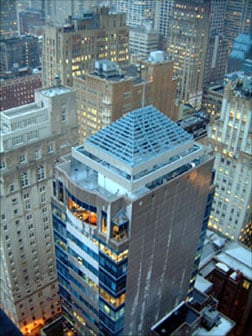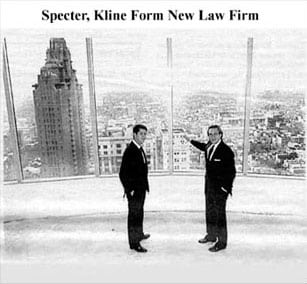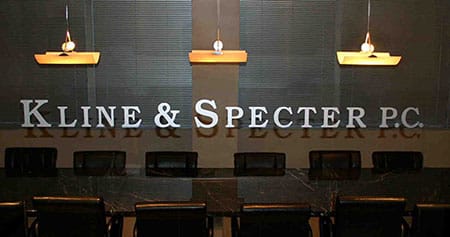In 1995, Tom Kline and Shanin Specter started their own practice, opening an office on the top floor of a building in Philadelphia with one associate attorney and four staffers.
Today, Kline & Specter, PC occupies 12 floors of the same building at 1525 Locust St. with more than 50 attorneys, five of whom are also medical doctors, the most of any firm in the United States. Victories have followed, including hundreds of multi-million-dollar verdicts and settlements, some of them record-setting, and even two in the billions — a $8 billion verdict against Johnson & Johnson in 2019 involving the anti-psychotic drug Risperdal, and a $2.25 billion verdict against Monsanto in 2024 over its weed killer, Roundup.

Accolades and honors abound. The firm has been cited as "one of the country’s leading personal injury firms" by The Philadelphia Inquirer, referred to as "a powerhouse law firm" by The New York Times and called "the most powerful plaintiffs firm in the city" by the Philadelphia Business Journal. Law360 name it a Pennsylvania Powerhouse and one of its Product Liability Groups of the year.
Kline & Specter has attracted outstanding lawyers. Twenty-five of its attorneys have been selected as among “The Best Attorneys in Pennsylvania” or “Rising Stars” by the independent survey group Super Lawyers, with Tom Kline in 2025 selected as the No. 1 attorney in Pennsylvania a record (for any state) 22 straight years. Both Kline and Specter have been recipients of the Michael A. Musmanno Award, the highest honor conferred by the Philadelphia Trial Lawyers Association.

Back in the 1980s, before opening their own firm, Tom Kline and Shanin Specter began litigating and trying pharmaceutical products liability cases. Kline won the largest jury verdict of $5.1 million in the Dalkon Shield mass tort litigation against A.H. Robins Co. Specter won major victories involving the arthritis drug Oraflex, manufactured by Eli Lilly. Kline followed with multiple million-dollar verdicts in Bendectin cases, including a $19.2 million verdict in Blum v. Merrell Dow, exposing the company’s improper drug testing and reporting.

Only six months after opening Kline & Specter, Specter won a $24.25 million jury verdict for a little girl left severely brain damaged in a swimming pool accident. (See Weightman v. National Realty Corp.) At the time, it was the largest compensatory damage verdict ever awarded in Pennsylvania. He followed that with Sparber v. DuPont, a case that resulted in a Delaware-record $19.9 million verdict against a hospital for a teenage patient accosted by a visitor. In the years since he has obtained more than 200 jury verdicts and settlements in excess of $1 million and more than 50 case resolutions — including 16 verdicts — greater than $10 million.
Among his verdicts are $153 million against Ford Motor Co. over a deadly defective parking brake and a $109 million verdict (and subsequent $105 million settlement) against an electric power company in a fatal fallen wire case.
In 2019, Specter obtained a $75 million settlement, the largest pre-trial settlement in a case in Pennsylvania history.
Kline also had major verdicts not long after opening the firm’s doors, one of them the celebrated $51 million jury award in (Hall v SEPTA) for a young boy whose foot was amputated in a subway escalator. He went on to win a long list of impressive verdicts and settlements, most notably perhaps his $8 billion Risperdal verdict against J&J, his trio of verdicts against Monsanto over their weed killer Roundup for $2.25 billion, $175 million and $78 million respectively, the $4.85 billion Vioxx settlement in which he played a key role, and, as chairman of the plaintiffs management committee in the Amtrak 188 derailment litigation, his leadership in in obtaining a $265 million settlement for injured passengers and the families of those who died.

Other attorneys at the firm also have notched substantial courtroom victories, such as the verdict and subsequent arbitration award of $95.6 million for a woman horribly injured in the Center City Philadelphia Salvation Army building collapse, the largest personal injury recovery for one person, as well as a $100 million verdict in a medical malpractice case, the largest-ever compensatory and medical malpractice verdict in Pennsylvania. (See The Vlasny case.)
The litany of legal triumphs continues to the current litigation against the manufacturers of transvaginal mesh in which Kline & Specter attorneys have won verdicts of $120 million, $80 million, $57.1 million, $41 million, $20 million, $13.5 million and $12.5 million.
In additon to skillful trial attorneys, the firm also has a robust appellate practice, led by Chip Becker, that has argued and preserved the largest verdicts in Pennsylvania, as well as argued significant cases to protect and expand plaintiffs' rights.
Beyond monetary awards, the firm’s cases have prompted safety changes in government and industry. (See Safety Improvements) Litigation has spurred action for product recalls, changes in hospital protocols and new rules for citizen protection. The Hall case, for instance, prompted SEPTA to upgrade all of its escalators to include safety devices. In the Gillyard/Rich civil rights case, Shanin Specter got the Philadelphia Police Department to establish new guidelines requiring safer operation of squad cars. And the firm’s representation of a victim in the Sandusky child sexual abuse case helped to affect changes in the university’s policies and practices. Most recently, efforts by Kline & Specter attorneys helped enact the Timothy J. Piazza Act aimed at deterring hazing on college campuses and elsewhere.
The firm also has an active democracy practice, dedicated to upholding the rule of law and ensuring constitutional rights are protected. That means taking on cases and causes that advance and protect our nation's democracy and our state and federal constitutions.
Kline & Specter has a long history of advancing causes that help make society safer and better. The firm has fought for such basic rights as the right to a trial by jury and against unconstitutional measures like the statutory caps on verdicts against state agencies in Pennsylvania that prevent injured plaintiffs from being made whole.
Most recently, the firm has been a vocal opponent to President Trump's unconstitutional executive orders targeting law firms. The firm contributed to and signed amicus briefs in support of law firms fighting the orders, and it wrote and filed amicus briefs on behalf of law students nationwide in support of Susman Godfrey, as well as Jenner & Block.
Kline & Specter and its attorneys also make substantial contributions to a long list of charities and public institutions in the community (see our Charities page), including a donation of $50 million by Tom Kline to Drexel University's Kline School of Law (Read about the donation) and another $50 million to the Kline School of Law of Duquesne University.


